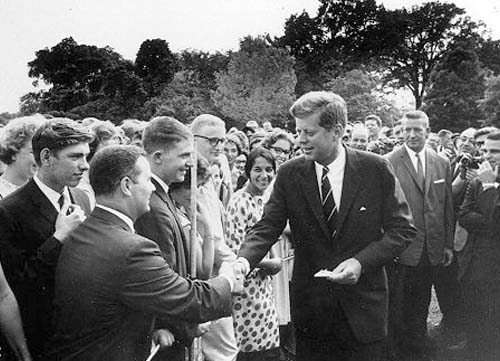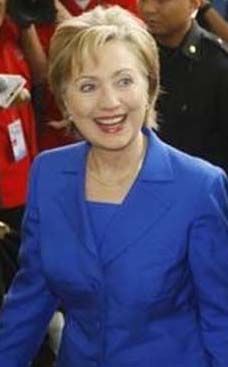
Dollar for dollar, you cannot get a more reliable, cost-effective answer than the Peace Corps when the challenge is to win hearts and minds around the globe. For all of Africa's wars since President Kennedy launched the Peace Corps in 1961, one of the continent's most liberating achievements in the intervening decades has been the education of millions of African children by Peace Corps volunteers. Those once illiterate students are now Africa's middle class, civil servants and leaders, struggling to meet their nations' basic needs. Throughout Africa's villages and cities, portraits of Obama have already been tacked on walls next to images of the Kennedy brothers, Martin Luther King Jr. and Nelson Mandela. It's impossible to go anywhere in Mozambique without hearing someone repeat what has become the world's marching order for a better future: Sim, podemos. Yes, we can. Obama, our No. 44, who has a passion for saluting the creative legacies of his predecessors by assimilating their sensibilities into his own actions, should continue that fine habit by adapting a slogan of No. 43 to No. 35's powerful enduring vision of international service: No Volunteer Left Behind. And in the eyes of the world, Mr. President, if you want the biggest symbolic bang for your ever dwindling buck, rebuild the Peace Corps.
Bob Shacochis writes: Rebuild the Peace Corps
Rebuild the Peace Corps
More than ever, the world needs ‘underutilized’ organization
By Bob Shacochis
Last month in central Mozambique, one of the planet's poorest countries, I stood among the thatched mud-and-wattle huts of the village of Vinho. I was admiring the subsistence farming community's handsome new school with Greg Carr, an American philanthropist who had built that school. Since 2004, Carr, who made his fortune in the information technology boom of the '90s, has devoted his wealth, time and considerable energy to the rehabilitation of Mozambique's Gorongosa National Park. Once considered Africa's premier game preserve, Gorongosa had been destroyed by decades of war and lawlessness.
The school is a small part of the comprehensive vision of Carr and Mozambique to use the restoration of the park as a development engine for the hundreds of thousands of desperately impoverished peasants who live in the forests and hills surrounding Gorongosa. The 20-year-long hand-back agreement between the government and the Carr Foundation is an exemplary model for the marriage of private altruism and public policy in the Third World.
Even so, the day Carr and I toured the school, marveling at its solar-powered electricity and computer lab, his voice grew somber as he responded to my questions.
How many students?
Two hundred.
How many teachers?
Five.
Carr explained that the government had an uphill battle trying to staff its schools with qualified teachers. Even when a teacher was hired, his or her tenure was a daily concern because of the high rate of attrition caused by AIDS, malaria or other diseases. Vinho's five teachers had dwindled to three. Carr thought the best hope for fully staffing the school had only one apparent solution: the Peace Corps. But he wasn't optimistic. There were only two Peace Corps volunteers — much-loved teachers — in the entire district, based in a town an hour's drive away.
Does Mozambique want more Peace Corps volunteers assigned to the country? Absolutely. The Peace Corps has been in Mozambique since 1998, after its civil war ended and its once Marxist-Leninist leaders changed ideological direction. The nation held free multiparty elections and did everything possible to make itself one of the most progressive countries in the region. There are 163 volunteers in Mozambique, where Portuguese is the official language. Carr and his Portuguese communications director, Vasco Galante, guessed the country could absorb 10,000 volunteers.
So here we find ourselves, celebrating the inauguration of President Obama, a farsighted leader who has inspired millions of young Americans with his call to service. We also find ourselves on the threshold of Secretary of State Hillary Clinton's new diplomatic initiative, the exercise of "smart power" in a multifaceted effort to reclaim our moral and political integrity in the eyes of the world. The obvious equation seems written in neon: "Call to service" plus "smart power" equals Peace Corps.
Dollar for dollar, you cannot get a more reliable, cost-effective answer than the Peace Corps when the challenge is to win hearts and minds around the globe. For all of Africa's wars since President Kennedy launched the Peace Corps in 1961, one of the continent's most liberating achievements in the intervening decades has been the education of millions of African children by Peace Corps volunteers. Those once illiterate students are now Africa's middle class, civil servants and leaders, struggling to meet their nations' basic needs.
Today, the U.S. sends fewer than 4,000 Peace Corps volunteers overseas annually — half the number we sent four decades ago. The agency, which is underfunded, underappreciated and underutilized, turns away too many prospective volunteers for lack of resources. More than 20 countries that do not have Peace Corps programs are waiting for Congress to keep its bipartisan promise to double the Peace Corps' size. But that promise is likely to wither on the vine of our shrinking economy without Obama's support, which would be the equivalent, in budgetary terms, of upgrading a shoestring to a bootstrap.
Throughout Africa's villages and cities, portraits of Obama have already been tacked on walls next to images of the Kennedy brothers, Martin Luther King Jr. and Nelson Mandela. It's impossible to go anywhere in Mozambique without hearing someone repeat what has become the world's marching order for a better future: Sim, podemos. Yes, we can.
Obama, our No. 44, who has a passion for saluting the creative legacies of his predecessors by assimilating their sensibilities into his own actions, should continue that fine habit by adapting a slogan of No. 43 to No. 35's powerful enduring vision of international service: No Volunteer Left Behind.
And in the eyes of the world, Mr. President, if you want the biggest symbolic bang for your ever dwindling buck, rebuild the Peace Corps.
Author Bob Shacochis is a member of the advisory board of MorePeaceCorps, a group of former volunteers. He also teaches in the graduate writing program at Florida State University.












